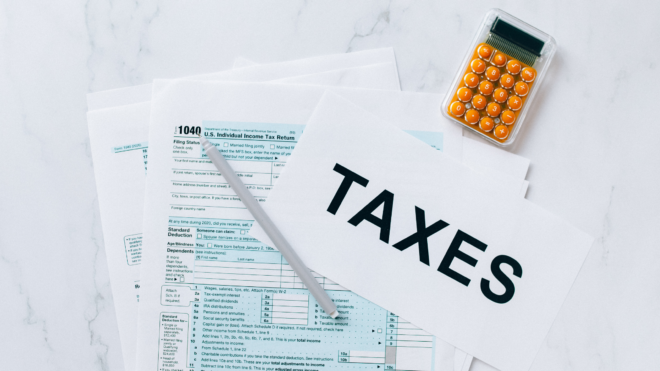It’s officially tax season. If you’re looking for ways to save money on your taxes, we want you to know that the financial professionals at CKS Summit Group are here for you.
Retirement planning is an important part of ensuring that you have enough money to live on during your golden years. One important aspect of retirement planning is tax planning, as taxes can eat into your retirement savings if you are not careful.
Here are some tips to help you save on taxes while planning for retirement with CKS Summit Group.
1. File on time
The upcoming tax season is a great time to start thinking about the taxes you owe and what you may be able to deduct. If you don’t file federal taxes or file for an extension by April 18, 2023, you may face hefty fines. Each state has different tax filing deadlines. It’s always best to check with your state’s department of revenue.
The amount of taxes you owe is based on your taxable income. To calculate taxable income, subtract all allowable deductions from your total income. Deductions reduce the total income your taxes are based on. For example: $50,000 taxable income – $2,000 tax deduction = $48,000 new taxable income. Tax credits reduce the total income tax you owe. Use our free online calculators here to help.
2. Retirement Contributions and Taxable Income
Tax-advantaged retirement accounts are a great way to save for the future, and there are two common types: Traditional IRAs and 401(k)s or 403(b)s.
Traditional IRAs and 401(k)s or 403(b)s are both pre-tax retirement accounts. This means that you can reduce your taxable income by making contributions. Here are some other strategies that can help you save for retirement:
- If you’re self employed or a business owner, you can contribute to a SEP or Simple IRA account.
- If you’re 50 or older, take advantage of catch-up contributions.
- Looking for tax-free retirement withdrawals? Utilize a Roth IRA or Roth contributions to a 401(k).
3. Consider Itemizing
If you’re 65 or older, you can get an additional deduction on your taxes. This deduction offsets expenses that seniors have in their day-to-day lives. The amount of this allowance depends on how much earned income (wages, self-employment earnings, interest, dividends and capital gains) you have.
4. Donate
If you’re thinking of making a charitable gift, consider setting up a donor-advised fund.
Donor-advised funds are simple and tax-effective ways to give to your favorite charities. With a donor-advised fund, you can make donations of cash or other assets. These assets are eligible for tax deductions.
Most charitable gift donation deadlines were December 31st. Those donations could be included in your 2022 taxes. The number of charitable causes you support is unlimited—you can choose as many as you like.
5. Use HSAs
Health Savings Accounts (HSAs) are tax-advantaged savings accounts that can be used to pay for qualified medical expenses. Contributions to an HSA are tax-deductible, the money in the account grows tax-free, and withdrawals for qualified medical expenses are not taxed. This tax treatment can result in significant savings for individuals and families, as it effectively reduces their overall tax liability.
To Summarize
To conclude, here are the key areas to focus on this tax season to help reduce the money you hand over to Uncle Sam:
- Max out your 401(k) and IRA contributions: Contributions to 401(k) and IRA accounts are tax-deferred, which means that you will not have to pay taxes on the money until you withdraw it in retirement. By maxing out your contributions, you can reduce your taxable income and potentially lower your tax bill.
- Consider a Roth IRA or Roth 401(k): Unlike traditional IRA and 401(k) contributions, contributions to Roth accounts are made with after-tax dollars. However, the money in these accounts grows tax-free, and withdrawals in retirement are also tax-free. This can be a great option for those who expect to be in a higher tax bracket in retirement.
- Use a Health Savings Account (HSA): HSAs are tax-advantaged accounts that can be used to pay for qualified medical expenses. Contributions to HSAs are tax-deductible, the money in the account grows tax-free, and withdrawals for qualified medical expenses are also tax-free.
- Take advantage of deductions and credits: There are many deductions and credits available to retirees that can help reduce your tax bill. Some of the most common include deductions for mortgage interest, state and local taxes, and charitable donations. Additionally, there are various credits available for retirees, such as the credit for the elderly or the disabled.
How CKS Summit Group Can Help
Tax filing season is upon us, and with it comes a lot of pressure to file your taxes this January. If you’re not ready to file your return, don’t feel pressured to do it this month. You can easily push back filing to February and March.
However, the sooner you file, the less likely you are to run into errors and issues that could delay your refund or cause other problems with your return.
Get a head start this year and help maximize your retirement income with the retirement advisors at CKS Summit Group. Contact us here today to set up your complimentary strategy session!
SMART Retirement With CKS Summit Group
SMART is the Strategic Movement Around Retirement Taxation and its goal is to limit your post-retirement taxation – not your income. With our SMART Retirement Portfolio you can learn:
- How to use tax arbitrage to dramatically increase your retirement income without risk.
- Ways to reduce the amount of money you give to the IRS during retirement.
- Why rate of return is Wall Street’s half-truth and how they use misleading math to sell you.
Ready to get SMART about your retirement? Learn more about targeting the lowest Tax Rate you can legally achieve during retirement here.



